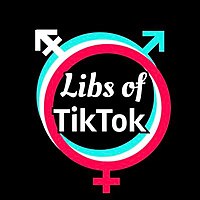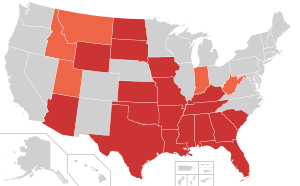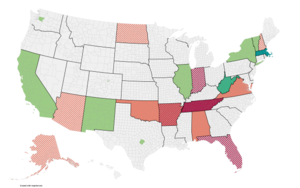| 2020s anti-LGBT movement in the United States | |
|---|---|
| Part of homophobia, biphobia, transphobia and LGBT history in the United States | |
 U.S. representative Marjorie Taylor Greene of Georgia and Libs of TikTok creator Chaya Raichik holding a sign in March 2023 stating that there are only two genders | |
| Date | 2021 – ongoing |
| Location | United States |
| Caused by | Increasing transparency, relevance, and acceptance of LGBT identity in the United States |
| Goals | To reverse social change in relation to LGBT rights in the United States, far-right extremism |
| Methods |
|
| Status | Ongoing |
The 2020s anti-LGBT movement in the United States is an ongoing political backlash from social conservatives against LGBT people. It has included legislative proposals of bathroom use restrictions, bans on gender-affirming care, anti-LGBT curriculum laws, laws against drag performances, book bans, boycotts, and conspiracy theories around grooming. Between 2018 and 2023, hundreds of anti-LGBT laws were considered, with more than one hundred passed into law.
The backlash has been described as a moral panic and part of a larger culture war in the United States. Scholars have cited rising anti-LGBT attitudes and policies as an example of democratic backsliding. The backlash has been connected to similar conservative backlashes in Hungary, Russia, Europe and the Middle East.
Grooming conspiracy theory
In the United States, the popularization of the term has been linked to Christopher Rufo, who tweeted about "winning the language war", and James A. Lindsay in August 2021. Following the Wi Spa controversy in July 2021, Julia Serano noted a rise in false accusations of grooming directed towards transgender people, saying that it appeared as if there was a movement to "lay the foundation for just smearing all trans people as child sexual predators". Libs of TikTok (LoTT) also slurs LGBT people, supporters of LGBT youth, and those who teach about sexuality as "groomers." In 2021, LoTT made false claims that the Trevor Project was a "grooming organization" and that Chasten Buttigieg was "grooming kids". LoTT creator Chaya Raichik said on the Tucker Carlson Today show that LGBT people "Want to groom kids. They're recruiting."

The conspiracy theory then moved into the American conservative mainstream, with a number of high-profile cases of its use in spring 2022, including its use by members of the Republican Party. On February 24, the right-wing Heritage Foundation issued a tweet stating that the Florida Parental Rights in Education Act "protects young children from sexual grooming". During the debate over the act, Christina Pushaw, press secretary to the state's governor Ron DeSantis, tweeted that anyone who opposes the act was "probably a groomer". In April 2022, Marjorie Taylor Greene referred to the Democratic Party as "the party of killing babies, grooming and transitioning children, and pro-pedophile politics". Also that month, a group of far-right extremists and conspiracy theorists held a demonstration at Disney World in which they accused Disney of grooming. Disney has been the focus of several other uses of the conspiracy – Jim Banks and 19 other members of the Republican Study Committee published a letter to Disney accusing the corporation of "purposefully influencing small children with its political and sexual agenda".
Since then, numerous right wing pundits have described the behavior of parents and teachers who support minors in their transgender identities as grooming, and the term "groomer" has widely been used by conservative media and politicians who want to denounce the LGBT community and its allies by implying that they are pedophiles or pedophile-enablers. Slate Magazine later described the word "grooming" as "the buzzword of the season". In March 2022, Fox News host Laura Ingraham claimed that schools were becoming "grooming centers for gender identity radicals", dedicating an entire segment of her show to the topic a couple of weeks later. In April 2022, the left-leaning media watchdog Media Matters published a study stating that within a three-week period spanning from March 17 to April 6, Fox News ran 170 segments on trans people, throughout which the network "repeatedly invoked the long-debunked myth that trans people pose a threat to minors and seek to groom them".
Education
Anti-LGBT curriculum laws

In July 2022, a wave of anti-LGBT curriculum resurgence saw ten such laws beginning to take effect in six different states. Some states enacting these new laws appear to have mirrored similar laws from other states.
In Florida, the Parental Rights in Education law and Florida Board of Education policy bans education on "sexual orientation" or "gender identity" unless it is mandated under state academic standards or as part of an optional reproductive health course or lesson. In August 2023, the state of Florida dropped AP Psychology as a course offering, due to a required section on sexual orientation and gender identity. The same month, Tampa-area schools announced they would restrict teaching of the works of Shakespeare in order to comply with the Parental Rights in Education law.
Alabama bans the topics for kindergarten to grade 5, except for instruction deemed "age or developmentally appropriate". Five other states (Montana, Arizona, Arkansas, Tennessee and Florida) require parental notification of instruction on LGBTQ issues and allows parents to opt-out of such instruction.
In California—where state law requires students learn about the "role and contributions" of LGBT people in history—multiple protests against the inclusion of LGBT-friendly curriculum resulted in violence. At a June 2023 protest in Glendale, individuals seen protesting LGBTQ curriculum were identified as members of hate groups, such as the Proud Boys.
Policies regarding trans students
Local K-12 school boards across the country adopted a variety of policies regarding trans students, ranging from allowing fully equal rights and non-discrimination for trans students, to requiring trans students to submit to a criminal background check to be allowed to use the bathroom consistent with their gender identity, to implementing full bans on expressing one's self-declared gender at all, including bans on chosen pronouns and pride flags, to even bans on mentioning the very existence of trans people. State and local officials in the South used indecency and obscenity laws to ban books from school libraries.
Rollback of discrimination protections
In June 2021, the Biden administration reinforced that Title IX protected LGBT students from discrimination by including sexual orientation and gender identity in its list of protections.
In August 2021, Tennessee and nineteen other states sued the Department of Education in Tennessee v. Department of Education, alleging that the new Title IX governance constitutes government overreach. A preliminary injunction was granted by a Tennessee judge in July 2022, blocking enforcement of the new guidance. In December 2022, the Department of Education appealed the decision, which is still pending.
The new guidance was rejected by the Florida Department of Education, calling the guidance a "sexual ideology" that risks the "health, safety, and welfare of Florida students".
Anti-trans laws
Gender transition

As many as 13 U.S. states banned gender affirming health care for transgender youth in the early-2020s.
Treatment for adults
Many Republican legislators across the country are increasingly proposing legislation that would restrict gender-affirming care for adults or make such treatments harder to access. However, no states have succeeded at outright banning gender-affirming care for adults in a way similar to what is being done with minors. Efforts to restrict adults' access to healthcare relies heavily on claims from self-described "gender-critical" organizations such as Genspect that young people should not be recognized as adults until they turn 25.
As of January 2024, seven states limit access to gender-affirming care for adults in some way without banning it, such as allowing private health plans, Medicaid, and correctional facilities to exclude all coverage for gender-affirming care, prohibiting the use of federal funds for gender-affirming care or requiring informed consent practices beyond those typically required in medical practice.
In January 2024, several Republican legislators expressed their desire to ban gender-affirming healthcare altogether saying their 'endgame' was to ban it completely for people of all ages.
As part of his 2024 presidential campaign, Donald Trump has stated that if elected, he will sign an executive order instructing every federal agency to cease the promotion of sex or gender transition at any age as well as ask Congress to pass a bill stating that the United States will only recognize two genders as determined at birth, and has promised to crackdown on gender-affirming care for all ages. Additionally, Trump stated that he would make hospitals and health care providers that provide transitional hormones or surgery no longer qualify for federal funding, including Medicare and Medicaid funding. Trump has also stated he will push to prohibit hormonal and surgical intervention for minors in all 50 states.
These states have policies making it easier for trans adults to sue their doctors:
- Utah: In January 2023, Utah stripped liability protections from any doctor who treats a trans person under the age of 25, and allowing any trans person under 25 to retroactively "disaffirm" consent and sue the doctor for providing care they had at the time consented to.
- South Dakota: In February 2023, South Dakota passed a similar law as Utah's, but without any age limit.
- Arkansas: On March 13, 2023, Governor Sarah Huckabee Sanders signed a bill giving adults 15 years to file malpractice lawsuits for gender-affirming care they received as minors, whereas for other types of care (under preexisting law) a malpractice lawsuit must generally be filed within two years.
These states have policies that restrict treatment for trans adults, as well as younger people:
- Florida: In August 2022, the state of Florida voted to require any trans adult seeking gender affirming healthcare to receive approval from the Florida Board of Medicine at least 24 hours in advance. On May 17, 2023, DeSantis signed a law banning insurance providers from covering gender-affirming care for adults, as well as banning nurse practitioners and physicians' assistants (estimated to make up 80% of gender affirming care providers) from administering it, and banning it from being offered via telehealth. The Florida state legislature had passed the bill the previous month. In June 2024, a judge permanently blocked the law from taking effect.
- Missouri: In April 2023, the state attorney general issued an emergency order instituting a three-year waiting period of continuous documented dysphoria before qualifying for gender-affirming care, disqualifying people if they have untreated depression or anxiety, mandates a screening for autism, and mandating regular screenings for "social contagion". This has been characterized by many as a de facto ban on trans healthcare for adults, since depression and anxiety are common symptoms of gender dysphoria. A judge temporarily blocked enforcement of the order and scheduled a hearing for May 11. The attorney general withdrew this order on May 16 after the state legislature passed two bills restricting gender-affirming care for trans youth. On June 7, 2023, Governor Mike Parson signed a bill that contained a provision banning gender-affirming care for prisoners, which took effect on August 28.
Treatment for minors
Gender-affirming care for minors has been available in the U.S. for more than a decade and is endorsed by major medical associations, but it has increasingly come under attack in many conservative legislatures. According to the ACLU, in 2023 alone, over 500 anti-LGBTQ bills were submitted in the US, over 130 of which were about healthcare. Efforts to prohibit gender-affirming care for minors had begun several years earlier, but did not receive much attention from state legislatures until more recently. The conservative organization Do No Harm was influential in developing model legislation that appeared starting in 2022 in Arkansas, Florida, Iowa, Mississippi, Montana, New Hampshire, and West Virginia legislatures.
In February 2024, the American Psychological Association approved a policy statement supporting unobstructed access to health care and evidence-based clinical care for transgender, gender-diverse, and nonbinary children, adolescents, and adults, as well as opposing state bans and policies intended to limit access to such care.
As of May 2024, 25 states had enacted some form of ban on gender-affirming care for minors, 19 of which were enacted in 2023. However, 16 of these bans are being challenged in court as of January 2024. Furthermore, only 16 of the 25 states have complete bans which are fully in effect. Five states have only partial bans and four are currently blocked from taking effect. While some states have banned all forms of medical transition, others such as Arizona, Nebraska and Georgia have banned only specific types such as hormone therapy or surgery. Six states have exceptions which allow minors who were already receiving gender affirming care prior to the ban to continue their treatments. Currently, all 25 states make exceptions for puberty blockers, hormones and surgery for cisgender and intersex children. Only one state, West Virginia, makes exceptions in cases of "severe dysphoria". There is also currently only one state, Missouri, that has a ban which is set to expire after a certain period of time. Nearly all states with restrictions include specific provisions with penalties for providers and 4 states include provisions directed at parents or guardians. An additional 4 states include laws/policies that impact school officials such as teachers and counselors, among others.
At the same time, many Democrat-controlled states have gone in the opposite direction and enacted laws protecting access to gender affirming care for minors and adults. These laws, often called "shield" laws, often explicitly combine protections for gender-affirming care and abortion and cover a variety of protections including protecting both providers and patients from being punished, mandating insurance providers to cover the procedures and acting as "sanctuary states" that protect patients traveling to the state from other states that have banned such treatments among other things. As of April 2024, 15 states and the District of Columbia have enacted "shield" laws.
Of the approximately 1.6 million Americans who are transgender, about 300,000 are under the age of 18. As of October 2023, approximately 105,200 transgender youth aged 13 to 17 lived in states where gender affirming care is banned for minors. However, around 26,000 of those youth are currently still able to access care in their state due to court orders that prohibit enforcement of the laws. Conversely, around 146,700 transgender youth live in states that have passed gender-affirming care "shield" laws that support access to care by protecting doctors and parents who prescribe or seek access to medical care for youth. An analysis from KFF in late January 2024 estimated that 38% of trans youth between the ages of 13–17 in the United States lived in states with laws limiting youth access to gender-affirming care.
Protections for minors
Sports bans

Some U.S. states passed legislation restricting the participation of transgender youth in high school sports or of trans women and girls in women's sports.
25 U.S. states have banned transgender people from sports under their gender identity in various capacities. These states include Texas, Arkansas, Florida, Alabama, Oklahoma, Kentucky, Mississippi, Tennessee, West Virginia, South Carolina, Utah, South Dakota, Montana, North Dakota, Iowa, Arizona, Idaho, Indiana, Wyoming, Louisiana, Kansas, North Carolina, Ohio, Alaska and Georgia. The US Department of Education has said transgender students are protected under Title IX.
- In Indiana, schools rely on anatomical sex, requiring gender reassignment surgery for trans athletes to participate in the sport of their identified gender.
- Nebraska has formed a Gender Identity Eligibility Committee that decides on a case-by-case basis of how each transgender athlete can participate as their self-identified gender.
- Texas, Alabama, North Carolina, Kentucky, Idaho, and Florida require trans athletes to compete based on their biological sex.
- In Alaska, Connecticut, Georgia, Kansas, Pennsylvania, and Wisconsin, each school district makes their own decision on how to include transgender athletes.
- Maine gives approval for students to choose which team they wish to play on, approving based on safety and fairness.
- New Jersey and New Mexico require that trans athletes provide evidence that they have transitioned or are transitioning.
- Missouri and Ohio require athletes to undergo hormone treatment. Ohio requires that the athlete must have been on the hormones for at least a year prior to competing.
- Oregon allows those who identify as male to participate on male teams, and they are then on excluded from girls' competitions. Those transitioning from male to female must be on hormone treatment for at least a year.
- Iowa bans transgender girls and women from playing female sports. No such stipulation applies to transgender boys and men with regard to male sports.
- Oklahoma requires that any student participating in sports must submit a notarized affidavit of gender assigned at birth, under penalty of perjury.
Bathroom bills

In an early example of an anti-trans bathroom bill, the Public Facilities Privacy & Security Act in North Carolina, was approved as a law in 2016. The bill, however, sparked widespread condemnation and threats of boycotts, and portions of the measure were repealed in 2017 as part of a compromise between the Democratic governor and Republican-controlled Legislature. Also in 2016, guidance was issued by the U.S. Departments of Justice and Education stating that schools which receive federal money must treat a student's gender identity as their sex (for example, in regard to bathrooms). This policy was revoked in 2017.
In the 2020s, bathroom bills have been proposed and debated in a number of state legislatures. According to the American Civil Liberties Union there are currently 469 anti-LGBTQ bills in the US, most targeting transgender people. Current examples include Kansas SB 180. Several state bills are based on and closely resemble model legislation provided by the conservative lobbying organization Alliance Defending Freedom (ADF), which has been classified by the Southern Poverty Law Center as an anti-LGBT hate group. The ADF's model legislation proposes giving any public school or university student the right to sue for $2,500 for each time they encountered a transgender classmate in a locker room or bathroom.
A number of the bills put forth and passed made it some form of criminal offense, often a sex offense, for a transgender person to use a bathroom, locker room, changing room, or other similar facility not corresponding with their assigned sex. The most severe of these was that of Arkansas, which made it an offense of "sexual indecency with a child" for a trans person to use any such facility if said facility contained anyone under 18 at the time of use.
Since 2021, Alabama, Arkansas, Oklahoma, Tennessee, and Idaho have enacted bathroom bills. State legislatures in Arizona, Illinois, Kansas, Kentucky, Massachusetts, Minnesota, Mississippi, Missouri, South Carolina, Tennessee, and Texas have proposed bathroom bills. The National Center for Transgender Equality, an LGBTQ advocacy group, calls these bills discriminatory.
In December 2022, sitting en banc, the United States Court of Appeals for the Eleventh Circuit ruled in Adams ex rel. Kasper v. School Board of St. Johns County, Florida that separating the use of male and female bathrooms in public schools based on a student's biological sex doesn't violate the Equal Protection Clause of the Fourteenth Amendment or Title IX of the Education Amendments Act of 1972. Previously, in August 2020, a three judge panel of the United States Court of Appeals for the Eleventh Circuit affirmed a 2018 lower court ruling in Adams v. The School Board of St. Johns County that discrimination on the basis of gender identity is discrimination "on the basis of sex" and is prohibited under Title IX (federal civil rights law) and the Equal Protection Clause of the 14th Amendment to the US Constitution.
Anti-drag behavior

Protests
Protests against drag performances, especially Drag Queen Story Hour, increased after the 2021 attack at the United States Capitol. The most vocal opponents are mostly affiliated with alt-right groups. Former Fox News host, Tucker Carlson, suggested that drag events could "indoctrinate or sexualize" children. Protestors also have expressed concern about homophobic conspiracy theories that performers are grooming children. The Anti-Defamation League reported that child abuse conspiracy theory has been fueled by the Libs of TikTok, a far-right Twitter account. The Gay & Lesbian Alliance Against Defamation reported over 120 threats against drag shows in the US, throughout 2022.
In mid-June 2022, the Twitter account, Libs of TikTok, condemned the upcoming Coeur d'Alene, Idaho's "Pride in the Park" festival due to a "family-friendly drag performance." On June 11, 2022, during the pride event, law enforcement arrested 31 members of the white nationalist and hate group Patriot Front, later charging them with conspiracy to riot. In May 2023, masked neo-Nazi groups in Ohio protested drag events in Wadsworth and Columbus, carrying anti-drag and anti-trans banners, such as one that read, "There Will Be Blood." A report from GLAAD noted there were 138 documented incidents of anti-LGBTQ harassment, vandalism or assault at drag shows in the United States from June 2022 through April 2023. An Institute for Strategic Dialogue report indicated that the Proud Boys were the leading group spreading anti-LGBT sentiment.
Laws and restrictions
On March 2, 2023, Tennessee governor Bill Lee signed the Adult Entertainment Act, which prohibits drag performances for children. This bill sparked outrage from the LGBT community. The states of Florida, Montana, and Texas have also passed laws banning public drag performances. However, all four of these drag bans were blocked by courts from taking effect.
Marriage

In response to a concurring opinion by Justice Clarence Thomas in Dobbs v. Jackson Women's Health Organization arguing the Court should reconsider Obergefell v. Hodges, Congress passed the Respect for Marriage Act in 2022. RFMA officially repealed the Defense of Marriage Act and required the federal government to recognize same-sex and interracial marriages, thus codifying parts of Obergefell, the 2013 ruling in United States v. Windsor, and the 1967 ruling in Loving v. Virginia. In addition, it compelled all U.S. states and territories to recognize the validity of same-sex and interracial marriages if performed in a jurisdiction where such marriages are legally performed; however, it does not legally compel states to perform same-sex marriages if Obergefell is overturned.
The following year, the Tennessee House of Representatives passed House Bill 878, which would grant an individual the right to refuse to solemnize a marriage if the individual has a religious or conscience-based objection to that partnership. In Texas, McLennan County Justice of the Peace Dianne Hensley filed a lawsuit to allow her to refuse to marry gay couples, citing the 2023 U.S. Supreme Court case 303 Creative LLC v. Elenis.
Book bans
Legislation was introduced or passed in at least 29 states taking aim at lessons that teach children about race and LGBT people, with most of the laws framed around putting a stop to critical race theory and gender ideology. These laws, which use broad language prohibiting teaching about privilege related to race or sex, or systemic bias in the United States, have led to many book removals. NBC News described the use of the term "critical race theory" in this context as "a catch-all term to refer to what schools often call equity programs, teaching about racism or LGBTQ-inclusive policies". The Takeaway's Melissa Harris-Perry cited discomfort with issues like gender identity as one of the common reasons for challenges, but that "this discomfort is likely imposed by adults onto young learners" who are otherwise more accepting and more likely to think outside traditional gender roles.
An example of such bans is that passed by Florida in March 2022, which created a list of sanctioned reading material for students in educational settings, and punished any teacher or school librarian whose classrooms or libraries contained unsanctioned books with felony charges. Sanctioned books must be reviewed by the state to be free of "prohibited material harmful to minors", which critics have said that under Florida state law includes content regarding the LGBT community and black history.
Boycotts
Matt Walsh @MattWalshBlog The goal is to make "pride" toxic for brands. If they decide to shove this garbage in our face, they should know that they'll pay a price. It won't be worth whatever they think they'll gain. First Bud Light and now Target. Our campaign is making progress. Let's keep it going.
May 24, 2023
Conservative activists urged for boycotting any company which publicly supported, or collaborated with members of, the LGBT community. Some of the most well-known examples included the 2023 Anheuser-Busch boycott against Bud Light for a sponsorship with actress and TikToker Dylan Mulvaney, and the campaign against Disney by Florida governor Ron DeSantis for publicly opposing the state's Anti-LGBT curriculum law. Other targeted companies include Nike, Adidas and Ford. In May 2023, Target removed several Pride Month items from stores in the Southern United States after anti-LGBTQ hate groups threatened violence against its employees.
Violence
According to a 2023 report by the Department of Homeland Security, threats of violence against the LGBT community rose in the early-2020s. The FBI also noted a sharp uptick in the number of hate crimes committed against LGBT people, with the 54 percent increase representing the fastest rise in hate crimes of all groups in the country. In New York City, hate crimes against LGBT people doubled from 2021 to 2022, and they grew by 29% in California during the same period. In August 2023, Lauri Carleton, a business owner in Southern California, was shot and killed for keeping a pride flag outside her store.
Public opinion
According to the Public Religion Research Institute, support for mandating that trans people use the bathroom corresponding to their gender assigned at birth rose among all religious groups, with white evangelical Protestants seeing the largest change, going from 41% in support to 72% in support between 2017 and 2021. 41% of total Americans held this stance, with 31% disagreeing, and 28% not taking either position.
60% of American adults reported in the summer of 2022 that they opposed allowing nonbinary marker options on government documents, while 58% reported supporting mandating that trans athletes compete on teams matching their gender assigned at birth.
An April 2021 PBS NewsHour/NPR/Marist poll with the question "Do you support or oppose legislation that would prohibit gender transition-related medical care for minors" found 66% of Americans would oppose a ban, including 69% of Democrats, 70% of Republicans, and 64% of Independents.
A February 2022 poll by LGBT support service The Trevor Project and Morning Consult found that 52 percent of American adults expressed some level of support for transgender minors having access to puberty blockers if it is recommended by their doctor and supported by their parents.
A Washington Post-KFF poll conducted in November 2022 found that 68 percent of adults oppose access to puberty-blocking medication for transgender children ages 10 to 14, and 58 percent oppose access to hormonal treatments for transgender children ages 15 to 17.
In a January 2023 Deseret News/HarrisX poll, 55 percent of Americans supported banning gender hormone therapy for transgender minors with parental or guardian approval, while 45 percent opposed such a ban.
A September 2023 poll by 19th News/SurveyMonkey found that 39 percent of American adults supported transgender minors having access to any kind of gender-affirming care, including puberty blockers, hormones, therapy, and surgery.
Media involvement
Supporters of LGBT rights argue that major US media outlets have taken part in furthering the backlash by publishing and promoting stories criticized by many experts and advocates as misinformation, fringe theories, fearmongering, and pseudoscience about LGBT people, and in particular trans people. Among these outlets were Reuters, Fox News, The Washington Post, The Atlantic, and most prolifically, The New York Times. These pieces have often been cited in legislation and court cases to restrict LGBT rights.
Responses
Domestic
Relocation
Some trans people and their families have fled to other states or countries, including the families of those who actively advocated against anti-trans laws in their states. Many families cite increasing social pressure and restrictions on gender-affirming care as reasons for moving.
Several states passed legislation preventing trans people and their families, as well as their healthcare providers relocating from other states, from being extradited. In 2022, Connecticut became the first state to implement such a law, alongside similar protections for reproductive healthcare providers and recipients. Massachusetts, California, Illinois, Minnesota, New Jersey, Maryland, and Washington, D.C. have passed similar laws.
Some trans Americans have considered claiming asylum in other countries, including European countries or Canada. However, some political analysts note that asylum applications will likely be denied, as no federal law exists restricting LGBT safety and because transgender individuals can likely move to a safer state in their own country. Others worry that potential asylum applications could overwhelm immigration systems and prevent asylum access for those from more dangerous territory.
Self-defense
The increased targeting of LGBT people by right-wing militia groups such as the Proud Boys and the Oath Keepers, has led some LGBT people, particularly in conservative states such as Texas, to stockpile and train to use weapons and gear, including AR-15 rifles and modern body armor.
Travel warnings
In May 2023, the Human Rights Campaign issued a travel advisory for the state of Florida, citing new laws targeting the LGBT community.
International
After a ten-day tour in which he met with State officials in Alabama, Florida, and California in August 2022, Victor Madrigal-Borloz, a United Nations Independent Expert on protection against violence and discrimination, warned about the erosion of LGBT rights in the United States. Madrigal-Borloz stated, "I am deeply alarmed by a widespread, profoundly negative riptide created by deliberate actions to roll back the human rights of LGBT people at state level. The evidence shows that, without exception, these actions rely on prejudiced and stigmatising views of LGBT persons, in particular transgender children and youth, and seek to leverage their lives as props for political profit."
In August 2023, the Government of Canada issued a travel warning for LGBT visitors to the United States, advising citizens to check their destination's local laws before traveling.
